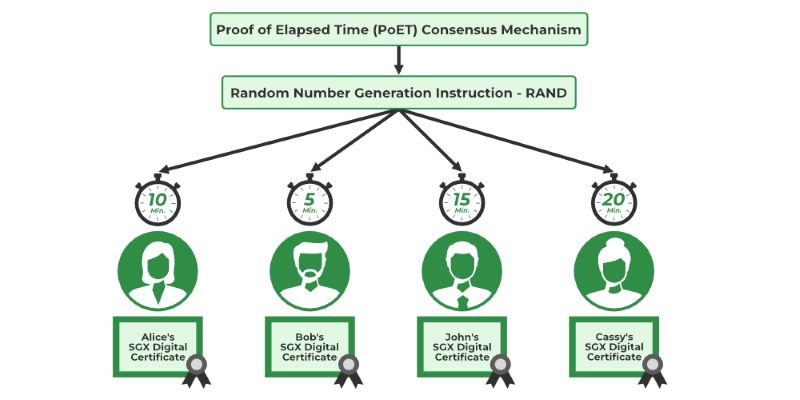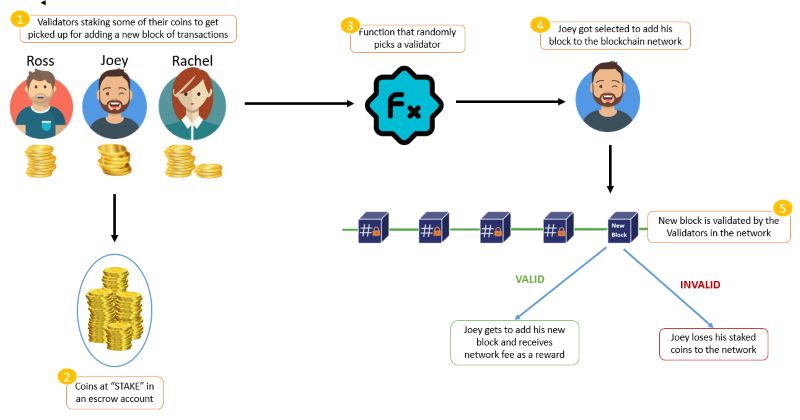What is proof of elapsed time in crypto? It’s a path less trod, but one with the potential to lead blockchain through a maze of challenges. Forget what you’ve heard about how cryptocurrencies tick; this isn’t about mining with more power than a small country. It’s about time itself carving out a new reality for trust in digital currencies. Stay with me, and let’s strip the complexity from this enigma. We’ll dive into how this mechanism promises efficiency without trading off the security we demand from modern cryptocurrency systems. Buckle up – you’re about to become the friend who explains crypto at dinner parties.
Demystifying Proof of Elapsed Time (PoET) in Cryptocurrency
Understanding the PoET Consensus Mechanism
Imagine you’re in a game where you need to wait your turn. That’s kind of what Proof of Elapsed Time (PoET) is like in the crypto world. But instead of playing a game, computers are waiting to add new info to the blockchain. They wait a random amount of time, and the first one that finishes waiting gets to add the info. It’s like a fair lottery where everyone has a shot.
Computers using PoET prove they waited by using a digital clock inside a safe computer zone called a trusted execution environment. This safe zone keeps other programs from messing around with the clock. One such safe zone folks use is Intel SGX. Because the clock is so well-protected, everyone trusts the wait times are fair.
The Role of PoET in Modern Blockchain Systems
PoET has a big job in blockchains. It’s like a kind security guard and timekeeper all in one. It keeps everything in order and makes sure no computer is cheating or trying to add bogus info. It does this in a way that’s way nicer to our planet than some other methods, like Proof of Work, where computers solve tough puzzles and use up a lot of power.
PoET is all about saving energy and playing fair. By using random wait times, every computer has a chance to add to the blockchain, and no single one is always first. This means the network stays safe and no one can mess with it easily.
PoET is a smart way to manage a blockchain. It makes sure the info is right and no one spends the same crypto twice. This is super important in money stuff because you don’t want anyone paying for things with money they don’t have.
Using PoET also means things can run smoothly even when tons of people are using the crypto network. This is big because as more people use crypto, we need systems that can handle the growth without breaking down.
So, Proof of Elapsed Time is a cool way that blockchains can stay safe, and fair, without using a bunch of energy. It’s also part of making sure that as crypto grows, it can keep up with all the action without dropping the ball.
The Technology Behind PoET: Trusted Execution Environments
Intel SGX: The Foundation of PoET’s Security
The Proof of Elapsed Time (PoET) works kind of like a digital clocking system. It picks who gets to add a block to the blockchain. Everyone takes a number and waits their turn. It’s super fair and uses way less power than older ways like Proof of Work.
Intel SGX is a cool tech that creates a safe space no one else can peek into. This space is where the PoET keeps its secrets safe. Even the computer running it can’t see inside. That’s how it stops cheaters and keeps your crypto safe.
How Trusted Execution Environments Maintain Ledger Integrity
A Trusted Execution Environment (TEE) is like a safe where you put all the valuable stuff that you don’t want anyone to mess with. PoET uses this safe to make sure nobody fakes the clocking system.
When a new block is ready, PoET checks the time in this super safe space. This check makes sure the same stuff doesn’t get added twice, which could mess things up. TEE makes everyone follow the rules, so everything stays in order.
In short, this neat tech makes sure that everyone in the crypto world plays fair. It’s like having a big, strong bouncer at the door of a club, making sure no one breaks in or cuts the line. This is what keeps your digital money safe and the whole crypto machine running smoothly without anyone using too much power.
Comparing PoET to Other Consensus Mechanisms
PoET vs Proof of Work: A Study in Energy Efficiency
You might be wondering, “What’s the big deal with Proof of Elapsed Time, anyway?” Let’s hash it out! Proof of Elapsed Time (PoET) kind of works like a fair lottery. Every computer gets a random wait time. The first to finish waiting gets to add a new block of transactions. It’s part of a group we call consensus mechanisms in cryptocurrency. These are the rules that keep everyone in the crypto world honest without needing a boss.
Now, PoET is energy-smart. It does not make computers work non-stop like Proof of Work does. In Proof of Work, computers race to solve tough math puzzles. They use tons of power, like a small country! PoET, on the other hand, lets computers chill while they wait. That saves a lot of energy, making it a green pick.
Understanding PoET validation is like knowing how traffic lights work. It keeps things moving smooth without a jam. It uses Intel SGX and PoET for security, which is like your secret clubhouse handshake. No one gets in unless they know the move. This means fewer worries about sneaky moves in the blockchain game.
Proof of Stake and PoET: Assessing Scalability and Security
Now, let’s talk shop about Proof of Stake and PoET. Picture a piggy bank; Proof of Stake says the more coins you’ve got in there, the more you can help run the system. It’s good for keeping things big and safe.
But PoET says, “Hold up! Why not just toss in a fair timer for everyone?” This way, big or small, every computer has a shot at winning the race. Fair is fair, right?
PoET’s random leader election is like picking a class helper. It could be anyone’s turn on any day. Decentralized network security is what this is all about. We don’t want any bullies taking over the playground.
For you, this means playing the game without fretting over someone cheating. We avoid problems like that nasty crypto double spend. Plus, it’s not just about stopping cheaters. It’s about keeping the network zooming along without hiccups.
Crypto network scalability gets a boost, too. With everyone getting quicker chances to verify block creation times, the network can grow without slowing down. It’s like adding more lanes to a highway. More cars, sure, but no traffic jams!
Bottom line, PoET keeps things light, fast, and fair. And fairness in cryptocurrency consensus is not just nice to have. It’s a must. Next time you hear someone saying, “My computer’s cooking an egg from all this crypto mining,” you’ll think, “Hey, why not try PoET and keep it cool?”
And remember, in this imaginative world of blockchain innovation, new ideas like PoET pop up to solve old problems and make sure we’re not just spinning our digital wheels. In a nutshell, PoET is not just kind to your power bill. It’s here to play nice with everyone in the crypto sandbox, helping us all build bigger and better castles together.
The Future of Blockchain with Proof of Elapsed Time
PoET’s Impact on Sustainable Cryptocurrency Mining
Proof of Elapsed Time (PoET) is changing the game in crypto mining. It’s a fair way to pick who adds the next block to the blockchain. Imagine a digital lottery where each computer waits its turn to win and get a chance to secure the network. The winner gets to record new info and is rewarded with digital coins.
PoET is a win for the planet too. It uses less power than older methods like Proof of Work. This means we can mine crypto without using so much electricity, making the whole process greener. Big data centers that mine coins often use a huge amount of power. With PoET, we keep our lights on without as much harm to Earth.
Understanding PoET is easier when we look at how it works. Each mining machine takes a random break. During this time, it cannot add info to the blockchain. When the break ends, the machine gets a chance to be in charge. It’s like a clock ticking down until your turn. Computers have rest times that vary, which keeps it fair. No one knows how long the other’s break is.
The system keeps track of these breaks and makes sure all is good with a tech called “trusted execution environments”. These are like vaults. They hide the details of each miner’s break from everyone else. Intel SGX is one kind of trusted environment used by PoET. It ensures that no one cheats by taking a shorter break.
Exploring the Potential for PoET to Enhance Decentralized Network Security
PoET helps make networks safe from attack. One way is by using a random leader election. This means no one can predict or easily change who will add the next block to the blockchain. It’s like a raffle where every computer holds a ticket, but only one ticket wins. This keeps things honest and secure.
In PoET, fairness is key. Since the process is random, it stops any one miner from always being in charge. It’s like making sure everyone gets a turn at the front of the line. This keeps the network from being controlled by just a few powerful players.
The system also fights against cheating, like double spending. That’s when someone tries to spend their digital coins more than once. With PoET, once a block is added with transaction info, it’s hard to change. This means that once you spend your coins, it’s final, and everyone’s money stays safe.
Another cool part of PoET is how it can handle lots of users. This is called “crypto network scalability”. The more people use and trust a crypto network, the more it grows. PoET is designed to work well even if tons of people join in. It keeps the network running smooth like a well-oiled machine.
To sum up, with PoET, we have a crypto world that’s fairer, uses less power, and is safer for everyone. More folks can trust and use crypto without fear of losing their money. And we all play a part in caring for our planet while we’re at it. How’s that for innovative and safe!
We’ve explored how Proof of Elapsed Time, or PoET, works in crypto. This system is key to blockchain. It keeps things fair without wasting energy. Think of PoET as a digital referee in a game where everyone follows the rules.
Intel’s SGX tech secures PoET and keeps the ledger true. It’s like a vault that guards our crypto data. Other methods like Proof of Work eat up more power than PoET. However, PoET and Proof of Stake both aim for safe, scalable networks.
Seeing PoET’s role in blockchain’s future is exciting. It promises cleaner mining and stronger security. This may make our digital money safer and kinder to our planet. PoET could be big for trust and safety in tech. Let’s watch where it goes!
Q&A :
What exactly is Proof of Elapsed Time in cryptocurrency?
Proof of Elapsed Time, or PoET, refers to a consensus mechanism used in blockchain technology to verify transactions and create new blocks. Essentially, it is a protocol that allows for the fair and random selection of a participant to add information to the blockchain, ensuring no single user benefits over others. It operates by using a timer system to prevent high resource usage and allows all participating nodes a fair chance at block creation.
How does Proof of Elapsed Time ensure security in blockchain?
Security in Proof of Elapsed Time is achieved by leveraging trusted execution environments (TEEs) such as Intel’s Software Guard Extensions (SGX). These environments ensure that the code operates as expected and provides a secure space where the timer can run without being manipulated. Thus, it ensures that the process of choosing a creator for the new block is random and cannot be interfered with by any party, maintaining the integrity of the blockchain.
Is Proof of Elapsed Time more energy-efficient than other consensus mechanisms?
Yes, Proof of Elapsed Time is considered to be a more energy-efficient consensus mechanism when compared to protocols like Proof of Work (PoW). PoW requires significant computational power and energy to solve complex mathematical puzzles. In contrast, PoET relies on a simple timer system within a secure environment which requires considerably less energy to operate, making it a more sustainable option for blockchains.
How is the ‘lottery’ system in Proof of Elapsed Time fair for all participants?
The ‘lottery’ system in PoET is fair for all participants because it uses random timer allocations for each node or participant in the network. Once their specific timer counts down to zero, the participant is then eligible to propose a new block to the blockchain. This mechanism ensures that the odds of proposing the next block are even for all nodes, regardless of their processing power, resulting in an equitable chance for each participant to contribute to the network.
Can Proof of Elapsed Time be used for all types of blockchain networks?
Proof of Elapsed Time is versatile and can be used for various blockchain networks that require a consensus algorithm that is both energy-efficient and fair. However, its implementation is highly dependent on trusted execution environments, so it’s more suitable for networks that can support this technology. Moreover, its adoption relies on the specific needs and trust model of a blockchain network. It is essential to consider factors such as network size, transaction volume, and security requirements when choosing a consensus mechanism.



